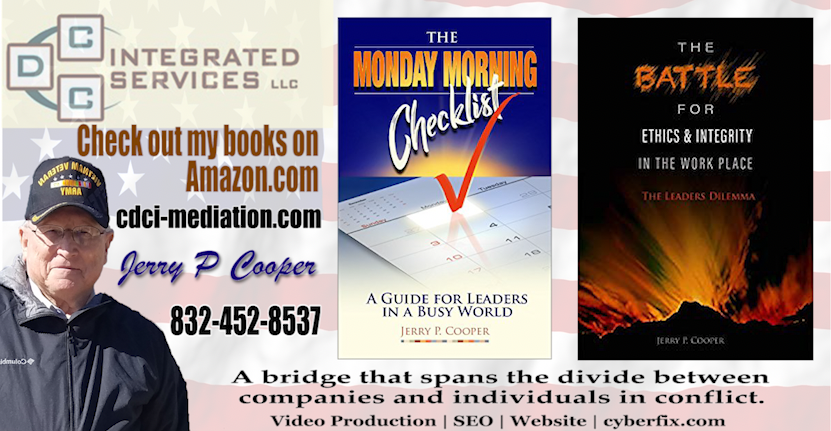Volume 5 | Issue 11
Putting it in contextA message from CDC Integrated Services, LLC
Look Beneath the Surface
Look Beneath the Surface
Fifteen years ago, Michelle Maiese wrote that opening paragraph in her article Causes of Disputes and Conflicts. What follows is an interesting article about the unstable environments that cause conflict to escalate – sometimes rapidly. It is surprising how quickly a conflict can become intractable and, when that happens, the efforts to dismantle that conflict are equally hard to execute successfully.
I re-read this article periodically to remind myself of several important truths. Solving the conflict won’t work unless you know what drives a particular conflict. Her article touches on a number of subjects that I talk about in my new book, which should be on Amazon in early November. Beneath much of the conflict, we see today are cultural issues and the environments that sustain these cultural differences.
Understanding these environments and the destructive aspects they contain must be addressed before the conflicts can be resolved in a lasting manner. Otherwise, any effort to solve a conflict will not hold up over time.
I am reminded of another quote by Peter Coleman, a well know scholar and writer on matters relating to conflict, who wrote: “once a conflict becomes intractable, constructing an agreement between the parties is like cutting marble to create a statue; one misstep and the results turns to rubble”.
This particular quote brings home the simple truth that when a conflict reaches that state more can go wrong than will go right. Those of us who deal with conflict are keenly aware of this dynamic. It is not necessary to look at the great geopolitical conflicts to understand the harm intractable conflicts cause. In everyday life and business, you will find examples where two parties whose ideas and interests are divergent to the point they stand in opposition to each other and do so to the point they are openly antagonistic one towards the other.
The existence of conflict is absolute, and in previous articles, I make this point to remind those reading my work that the existence of conflict does not represent a failure on the part of a company’s leadership, and it is not the fault of anyone manager.
The failure is in not recognizing conflict stems from an environment that is becoming unstable. Conflict thrives in unstable environments, and when conflicts become evident, it is not enough to deal just with the conflict. What lies beneath it must be dealt with as well.
Negotiating the resolution of conflict begins with establishing the quality of communication. This may sound like I am stating the obvious, but I am not. Communication during a negotiation; especially one addressing a conflict, must be supported by the civility of discourse among all the participants. When you achieve civility among the parties, you have a solid foundation on which to proceed.
We cannot have a truly mutual agreement without civility. It’s like a disruptive child in a school that cannot be taught unless the teacher establishes a peaceful discipline. Similar to how good teachers teach children, negotiation requires peaceful discipline. Civility requires no investment other than your own goodwill to support the negotiation, and it buys everything needed to solve the conflict; including the time and the willingness to look at alternatives. This is particularly important when addressing changes to work environments being distorted by cultural differences.
Negotiations achieve better outcomes, even in mediation, when the quality of the dialogue is defined by good communications. What defines good communications is civility; which is imperative when dealing with culturally based conflicts.
How do you establish civility among parties at odds with each other? The negotiator or mediator does this by first establishing an ethics-based framework for the discussions, and then creates the expectation of integrity on the part of the disputants.
Ethics and Integrity are often keys to successful conflict resolution. Do you know how well you are doing? CDC Integrated Services has a different approach. Want to know more? Please feel free to contact us. We are interested in your questions and concerns.
Food for thought: Often the only one who knows an ethical decision confronts them is the person doing the work. If you are doing the work first and foremost because it is the work you want to do and love doing, then making the right decision is easy because you do not want to diminish either yourself or the work.

Get In Touch
(832)-452-8537
(281)-861-4947
jerry@cdci-mediation.com

